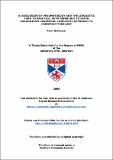Files in this item
A discussion of pneumatology and the linguistic turn to practice, with reference to Kevin Vanhoozer’s canonical-linguistic approach to Christian theology
Item metadata
| dc.contributor.advisor | Holmes, Stephen R. | |
| dc.contributor.author | Bellenger, Peter John Russell | |
| dc.coverage.spatial | 128 | en_US |
| dc.date.accessioned | 2010-04-09T08:52:22Z | |
| dc.date.available | 2010-04-09T08:52:22Z | |
| dc.date.issued | 2009-11-30 | |
| dc.identifier.uri | https://hdl.handle.net/10023/865 | |
| dc.description.abstract | This dissertation assesses the pneumatological implications of Kevin Vanhoozer’s canonical-linguistic approach to Christian theology, in the context of the wider issue of recent interest in re-conceiving the cultural-linguistic approach to theology through a description of Christian practice in directly pneumatological terms. I seek to welcome Vanhoozer’s communicative-act description of the authority and identity of Scripture as God’s written Word, and the way in which this description affirms the key insights of the linguistic turn to practice whilst maintaining the normativity of Scripture (as divine communicative action) to Christian practice (participation in that action). My concern is that Vanhoozer constructs his proposal around a Triune model of divine communicative action that I believe has pneumatological shortcomings. In particular, I think that the importance of God’s personal presence by the Holy Spirit is hard to convey within Vanhoozer’s canonical-linguistic theology. I argue that this matters because answers to the epistemological and hermeneutical questions that Vanhoozer is seeking to address require a fully Trinitarian theology that draws upon the significance of God’s indwelling presence by his Spirit. Such pneumatology is vital to the description of both the ontological distinction between God and creation and the divine-human relation in the economy of salvation centred upon the life, death and resurrection of Jesus Christ. It should be part of a fully Trinitarian theology that enables us to address questions of epistemology, hermeneutics and agency without making those concerns appear to determine the nature of salvation or the being of God. In making this argument, I draw in particular upon Colin Gunton’s discussion of Karl Barth’s triune model of divine self-revelation and Gordon Fee’s exegesis of Paul’s teaching on the Holy Spirit. | en_US |
| dc.language.iso | en | en_US |
| dc.publisher | University of St Andrews | |
| dc.relation | 'The Drama of Doctrine' by Kevin Vanhoozer | en_US |
| dc.rights | Creative Commons Attribution-NoDerivs 3.0 Unported | |
| dc.rights.uri | http://creativecommons.org/licenses/by-nd/3.0/ | |
| dc.subject | Pneumatology | en_US |
| dc.subject.lcc | BT121.3B46 | |
| dc.subject.lcsh | Bible--Canonical criticism | en |
| dc.subject.lcsh | Holy Spirit | en |
| dc.title | A discussion of pneumatology and the linguistic turn to practice, with reference to Kevin Vanhoozer’s canonical-linguistic approach to Christian theology | en_US |
| dc.type | Thesis | en_US |
| dc.type.qualificationlevel | Doctoral | en_US |
| dc.type.qualificationname | MPhil Master of Philosophy | en_US |
| dc.publisher.institution | The University of St Andrews | en_US |
This item appears in the following Collection(s)
Except where otherwise noted within the work, this item's licence for re-use is described as Creative Commons Attribution-NoDerivs 3.0 Unported
Items in the St Andrews Research Repository are protected by copyright, with all rights reserved, unless otherwise indicated.


